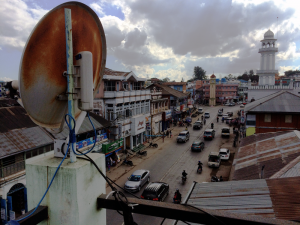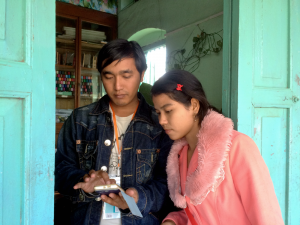24 November 15 – Tuesday – DAY EIGHTEEN
We’re back at Hone Hone’s for another day. The Balloon Festival is at night again, so we’ll shoot the last bits here and then head off later. Tonight we should shoot Tinmar Aung following the Ghost Gilbert through the festival. Now Gavin has finally succumbed to the virus. I think he may have contracted it a day or two ago, but he suppressed his symptoms so we would not know. Yes, even he must bow to the evil agent.
He suddenly turns to me and says “you know, if I ever make a movie like this again…” Cecilia interrupts as she walks by and finishes the sentence, “…don’t call me.”
Gavin continues. “If I ever make a movie like this again, I should probably have an editor working on it during production.” Of course I told him this three months ago. Gavin is not sleeping, worried about whether he has a movie or not. He really should have been editing all along, to ensure we had something. But despite his proclamation every day that he will begin such a process, he has only briefly explored that option, and he did so only last night. He did not get very far. But who has the time?
Also, to be fair, Gavin is not a big post guy. For those of you who may know, most workflows these days would rely on smaller and rougher versions of the footage, called proxies, to make an edit – especially when editing on low powered machines like laptops. The edit can be re-linked to the full-sized files at any point, but its usually at the end when you do final color and final sound mix. The 4K 1.85 files that our system was generating could certainly be previewed for short periods on a laptop, but the chances that the machine would crap out on so much data are actually quite high. So though Gavin could review the footage, he probably could not have edited much.
A better workflow for us would be to have had a dedicated editor on set. This person would be making proxies – probably overnight in a batch process – and then cutting the proxies to make yesterday’s scenes during the day. Either throughout the day by phone or at the end of each day after the shoot, that editor can then recommend re-shoots or inserts that might be needed and the AD can try to schedule them in.
But we did not have such a person. So now Gavin seems a little hung up on how he did not get what he wanted. I try to tell him that he does not want what he wanted. It is better rather to want what he got. Which is more of a documentary ethos anyway. And which is only appropriate because of the indeterminate nature of the project – we go back to the formal rigors that Gavin imposed on the project, including no script and no set schedule.
By this time you must be wondering where our heads were at. How could these people get into so much trouble? Well, there are a few things that are necessary to know about Gavin’s little crew. Perhaps most germane here is that at least two of those people, Cecilia and I, are very comfortable with the idea of indeterminism. For Cecilia it is her art school training; for me it’s just solo study.
If you’re interested, the concept of indeterminism in art is probably best exemplified by the works of John Cage and Morton Feldman, although Marcel Duchamps is a pretty big figure here, too. If a work is “determinist,” then the artist has directed every aspect of it, and the work is characterized by total control. This is a big 19th century idea – that of the artist as complete master over the materials and totally ruling the aesthetic.

The “indeterminist,” if there is such a word, would be interested in how the artist could relinquish control of certain aspects of the work. When Jackson Pollock dribbled paint, he was allowing gravity and the viscosity if the medium to become major factors in where that paint landed. Cage and Duchamps both composed music with dice, letting the random numbers determine pitch and duration. Feldman’s “graphic notation” was a way of writing music that showed in picture form a representation of what the music might be without indicating most of the qualities we consider music to have, like pitch, tone, duration, tempo, and dynamics.
So indeterminism is a very 20th century idea, and a natural swing away from the tight and authoritarian control of 19th century figures. The jazz improvisation is perhaps the most recognizable and familiar indeterminist process. No musician knows the precise notes he or she will play until they have happened. So indeterminism is a well established and fairly solid tradition, going back 60 or 70 years in art. If Gavin wanted to make a film that relied on some fairly heavy indeterminist structures? Well, why not? It’s as good in film as it is in music or visual art, right?
Of course we all knew that not every dribble from Pollock was a masterpiece, and that a lot of Cage’s music is better read about than actually heard. Cage even felt that way about some of it. But the conceptualist in at least two of Gavin’s crew were willing to go with it. Indeterminism is all about discovering what could happen when we do not force everything to happen, and it approaches a kind of Buddhist calm about letting things flow along the course they are already on. A dose of “wu wei,” the Taoist “non-doing,” seemed appropriate for a film in highly Buddhist Myanmar. And even today, while Gavin tells me he worries there’s not a film here, I am still undisturbed by the process we’re undergoing. I have faith in the Buddha, it seems. Our film will be the film that it is, and whatever we have, whatever footage we have shot, that’s what it is going to be.
But then again, I’m a little more comfortable with editing.
I still have a bit of a raspy cough. That’s over two weeks now. I’ll be cured of this just in time to get on a plane. In less than 10 minutes Sound is ready again, having wired up Gilbert and Nyin Zar Wai. Another mic has gone out, so apparently my soldering skills are not to be trusted. I can probably manage the rest of the week, but I’m probably going to solder it tonight if I can. I had five mics, now only three – there’s no three-person scene left to shoot in this thing, but I don’t like not having a backup – if only had a little downtime to do maintenance like this.

Gavin is desperate to find a new angle on the sewing shop – so much has been done already and were all very sick of shooting here. I am now dreading any scene with Gilbert. Hearing his distorted nasal voice sing vile Burmese pop songs in my ear constantly has taken a great toll on my peace of mind. I cannot wait until he’s wrapped. What a stark contrast to Tinmar Aung, who spends the whole day making unbearably cute noises and exclamations in my ear. I can’t understand those either, but they sure are fun.
We set up and shoot the end scene. It’s just Gilbert and Nyin Zar Wai – and no dialogue! It goes quickly once Gilbert stops being weird about putting his arms around Nyin Zar Wai. She’s three years his senior, but she’s also a lot more easy going and sophisticated. He’s an adenoidal teenager still. Gavin’s good, though, and he directs him well, allowing Gilbert to get comfortable and do the scene without pointing out how stiff he is.
I think mostly due to it being a non-dialogue scene, the end goes surprisingly fast. Two takes and the whole thing is over, with only one reverse to go.
Why is Nyin Zar Wai looking over my shoulder just now? She cannot possibly read this, right?
Sooner than I know, Nyin Zar Wai is, nonetheless, wrapped. There is a somewhat comical moment when I race to unstrap the mic from her leg, and, not finding the pack at all, check her other leg. I had actually taken it off before the reverses and had completely forgotten – so tired have I been. But now her scenes are done! Too bad, because she was good and had a soft low voice, an excellent thing in woman. I’m left with the shrill vocal stylings of Gilbert, who at least has Facebook to keep him comfortable and occupied right now.
With the movie’s end finished and time to kill before the Balloon Festival, Gavin is floundering. He is taking shots of Gilbert farting around the store – material that I know for sure he would have to be extremely cautious and creative in order to use. Meandering will be okay in the first part of the film, but if you have a great section of meandering after all the fireworks of balloons, it will only be seen as weak. Cecilia worries we’re going to end up with a “Scent of Green Papaya” problem – we both feel that Trang Ahn Hung’s first feature is a bifurcated movie that starts out fascinating and fun but ends quite dull. She’s concerned that Gavin will also have a film that that sends off the fun, exciting protagonist (Tinmar Aung) with fireworks and balloons only to go to Mr. Personality (Gilbert) and die like a wet fart. Again, the editing will tell.
Gavin shoulders on. Gilbert will now sort zippers and stare out the window.
Thiha is now promising me some local voodoo that is supposed to take care of my cough. He says “Two days! I guarantee it!” I wrangle the 2000 kyet (maybe $2) from Cecilia – I’m a desperate man. I’m imagining some horrible Chinese-style medicine – like bear gall or deer horn. Once Cecilia’s mom insisted that she and I take bear gall as it had some supposedly great properties. I have no idea if that crystallized yellow substance actually came from a bear, much less it’s gall bladder, but it was the nastiest, most bitter thing I’ve ever had in my mouth. Thiha could not possibly come up with anything worse than bear gall.
He runs off to get the remedy. It comes back as a blue indistinguishable pill called “BRONCHEST.” Thiha says “It’s from India. Indian medicine? The best.” Full disclosure: I think, maybe Thiha has Indian forebears. Anyway, I understand that most medicine in Myanmar is either counterfeit or otherwise bogus. But it’s okay if nothing happens, I’m not exactly out a lot of money – first of all it’s Gavin’s 2000 kyet, and secondly, it’s less than two dollars US.

Now the production is just plain down – waiting uncharacteristically, for Tinmar Aung to arrive. It is the all important first ghost encounter. Gilbert is wired, Gavin has a street picked out, and we’re waiting. Minshi has a stomach ailments beyond what we know as the sanctioned Production Virus the rest of us have had. Salai insists on another local remedy, a powder that smells like curry and is called “Poison Killer!” There’s a tiger on the label. So our confidence is high.
As it would turn out, Minshi actually had a norovirus, and in turn he would give it to the rest of us. So I would be riddled with diseases in short order.
Tinmar Aung arrives and the mood elevates. She declares that Minshi and Cecilia are her favorites. Why she feels this is necessary to declare, I’m not sure, but it has something to do with amused adults asking her such questions. I’m crushed, of course. She should like me best. But it’s not like it was a secret she doesn’t. Of course I’m not the favorite. I think Gavin is a little hurt, too. Like Hitchcock, he falls in love with his lead actresses. It must be horrible for him.
Gavin has found a great spot for the first ghost scene. Traffic drives right next to us – 8 inches away from the crew – we rarely move, which means the footage looks great, with cars and motorcycles right on the edge of frame. We may have a low budget, but our production value is certainly high, and we have not died yet, although the possibility is always there.
Having finished, we caravan off to the Balloon Festival again. We need the scenes of Tinmar Aung meeting Ghost Gilbert and the “cross fade” between them, by which we begin following Tinmar Aung and end up following Gilbert. No idea how Gavin wants to do this – we have all made suggestions, but he seems to be interested in something else entirely.
It’s already loud at the festival, and Gavin and Sean go scouting for picture while John catches coaches Tinmar Aung with her lines and I wait patiently. We’ve all sprayed for mosquitoes, because this part of the festival is next to an open field, and bugs are buzzing everywhere. We see clouds of male mosquitoes overhead. They don’t bite, but they’re obviously looking for the females, so it’s not good to have them around either.
There’s no Hone Hone box dinner today. I have one emergency granola bar left, and I’m starting to think about eating it. Suddenly, a profound depression overcomes me, as it can now and then. The usual litany of recriminations and self loathing spools out like an all-too familiar newsreel of disgust. A torture engine. I’m never sure how much of it is true, but I am old enough now to know it’s my usual depression come to get me. When I’m tired like this it’s not good to give me nothing to do, because I’ll always end up at this place. I’ll put my head down to get to work, as usual, but I’m hoping something happens to distract me with my duty.
Luckily, it does, and I go into immediate action. Gavin’s got the whole course planned out, and we get various shots of Tinmar Aung buying food and playing a dart throwing game. This last one goes over really well with our star, who proclaims “I don’t want to win a prize! I just want to throw darts!” She does, multiple times for multiple shots. She ends up winning an assortment of curious prizes – washing powder, instant cup noodle, some candy. None of it is that interesting to her, but at the end, when she has collected a number of these kind of useless prizes, the woman at the dart game counter suggests she could trade them all in for a stuffed animal – something a ten year old would probably want more anyway.
She chooses a kind of anime-inspired red goat. It’s the most inexplicable thing, and it cannot even stand up on its own, its head is so large. Tinmar Aung carries it around, fearful that if she takes it back to the orphanage Sister will not let her keep it. None of us can say for sure that she wouldn’t.

Later, we shoot the carnival, and Gilbert moving among the crowd, clad in his ghost outfit. Gilbert’s been with us the entire time, but he’s actually been texting his buddies, who have also come to the Balloon Festival tonight. It’s clear that he’s more interested in hanging out with them. The fact that he’s been on retainer the whole evening and has not done anything is not the best from a scheduling standpoint, but his paper-thin commitment to the project for this evening is also pretty irritating.
“How’s the shot?” Gavin calls out to Sean.
“Not good. Someone’s peeing in the frame.”
Sean has a way with words. Earlier in the shoot when he had been late to breakfast, he plead a delayed gastrointestinal event. “No one tells my bowels what to do,” he seriously intoned. I’ve been too busy to collect the Sayings of Sean into this little notebook of mine, and more is the pity.
Finally we reach the end of the carnival. The plan is to shoot the “cross-fade” between Tinmar Aung and Gilbert just at the edge of the carnival area, with the Ferris Wheel in the background and a crying Tinmar Aung in the foreground. And she’s ready to go. But Gilbert is not. After all this time waiting, he’s not bothered to learn his lines and now, with time and sun and everything perfect, he simply is not ready to go.
It’s also pretty loud, so we try a new location, and set up even further out. It’s still too loud. I’ve been relatively sanguine about the noise because – well, hey now – the noise is just there, and we’re not able to get rid of it. Yes, this will be a real screaming, pants-soaking nightmare to cut, but what can one do? So long as the lavs pick up good sound from the actors and the ratio of sound to noise is such that they can be understood, then the realistic backgrounds will be just what they seem to be – realistic backgrounds. I’ll have to deal with them on a complicated technical level, but that’s part of the job.

Cecilia looks at the clock. The average time for John to rehearse a scene with Gilbert plus how late it is plus how tired Tinmar Aung is equals doom in pretty short order. She pulls the plug. Get the girl home, pack it up. We’ll have to try the scene tomorrow. Everyone is disappointed, but there is a real wisdom to this. As it is we get back and in bed by 11. Tinmar Aung knows she gets to stay up late for this, and there is no school for her to go to tomorrow, but it’s still really bad form keeping her out this late. When we drop her off at the orphanage Sister is waiting up with the light on. No one is angry, but we feel irresponsible.
I come back to the hotel room and to the news, conveyed via Facebook, that my old school friend Joe Wilkes, a good friend and very funny writer, has finally succumbed to his overwhelming alcoholism. Joe had spent the last few years driving all his friends away and alienating anyone who cared about him, and finally his internal organs gave out and he bled to death. The news is almost impossible to fathom. It’s a connection to something far away – not only physically far, on the other side of the world, but psychologically far. It’s part of a whole life away, from a time when there was no film to work on, and with a guy who, I am ashamed to say, I had not seen in months while we waited for him to either finally hit bottom or to – well, I guess we were also waiting to hear that he had died, because he was doing his best to get there as soon as he could via his preferred method.
Joe was not just an old friend, he had worked with me on various projects, most notably featured as the hideous mother in my own film “Anna,” which Gavin shot years ago.

The first emotion I can feel, and the one that persists for months afterwards, is anger. How dare he do that to himself? How dare he throw himself away? It’s selfish – I know that. But I am also no stranger to at least some of Joe’s demons. He had support and the love of his friends at arm’s length, right there on the phone, whenever he wanted it. Why go this far?
It’s selfish and foolish of me, of course. Obviously Joe did what he could do, and though he had friends around, he either thought they were not enough or – let’s be honest – we simply really were not enough. Trying to find a source of blame for his death is useless. Though today’s production has been somewhat successful, the whole day feels like a disaster, emotionally and psychologically.
